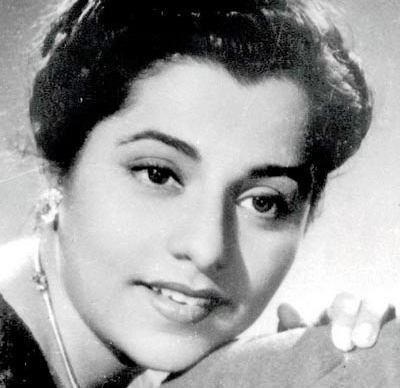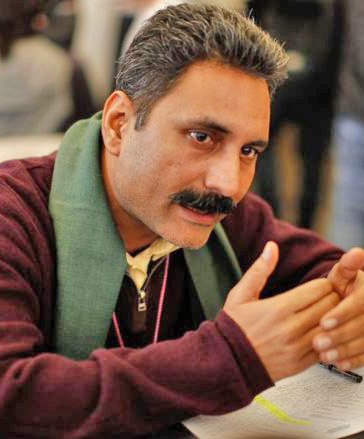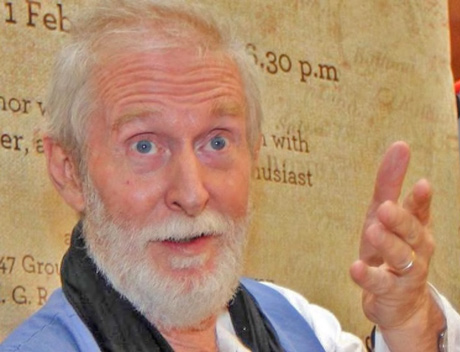Bollywood Masala Mix

By Divya Solgama
Usha Kiran was born on April 22, 1929. This Filmfare award Winner never wanted to be an actress in the first place. She was a good student and, left to herself, Usha would have been quite happy going through the everyday grind of school and studies. However, destiny had some other plans for her and she ended up amongst the arc-lights at a very early age.
At the age of 10, Usha was enrolled in a dance class and was learning Kathak. Very soon, she started her acting career on stage with M.G. Rangnekar’s Marathi play "Ashirward". At that time, Uday Shankar was scouting for talent for his ambitious film fantasy Kalpana. Usha and her sister were shortlisted and spent a few days at their dance academy. This provided her the first break in Hindi cinema. Usha has acted in successful Hindi films like Patita with Dev Anand, Nazrana with Raj Kapoor, Daag with Dilip Kumar, Badhwa, Kabuli Wala with Balraj Sahani, Chupke Chupke and Musafir. Her Marathi films include blockbusters like Kanyadaan, Shikleli Bayko, Bala Jo Jo Re, Postatil Mulgi, Udyacha Sansar, Garibagharchi Lek, Garambicha Bapu, Stree Janma Tujhi Kahani, Doodhava and Jasachya Tasa. Usha acted with greats like Raj Kapoor, Dev Anand, Ashok Kumar, Dilip Kumar, Rajendra Kumar, Rajesh Khanna, Dharmendra and Amitabh Bachchan.
In a career spanning over four decades, she acted in over 300 Hindi, Marathi and Gujarati films. Her most successful films include "Nazrana"; "Daag"; "Kabuliwala"; "Patita"; "Musafir" and "Bawarchi". She married Dr Manohar Kher in 1954 and soon had two children Adwait and Tanvi. She continued to work even after marriage but quit after her daughter's birth. She made a comeback to films with a character role in Hrishikesh Mukherjee's Bawarchi. She also acted in Hrishida's Mili and Chupke Chupke. In 1955, Usha Kiran won the Filmfare Award for Best Supporting Actress for the role portrayed by her in Baadbaan (1954). She was recipient of Maharashtra government award for best actress for her role in Kanyadaan.
Usha Kiran passed away on 9th March 2000 in Nashik due to cancer. She was 71. She is survived by her talented actress-daughter Tanvi Azmi, son Adwait Kher and husband Dr. Manoher Kher. Usha Kiran had also been Sheriff of Mumbai. She penned her autobiography, aptly named Ush-kal.
co-director overturned

New Delhi (CNN) – An acquittal in a high-profile rape case in India has reignited debate over the meaning of consent after a judge set aside the conviction of a Bollywood filmmaker, saying "a feeble 'no'" could still signal willingness on the part of an alleged victim.
Mahmood Farooqui, the co-director of the hit Bollywood film "Peepli Live," was sentenced to seven years in prison in 2016 after he was found guilty of raping a Columbia University graduate student at his home.
Farooqui's lawyers challenged the 2016 ruling in Delhi's High Court. In their appeal, they called attention to the lack of evidence that Farooqui was alone with the victim in his house on the night of the alleged incident. They also made an alternative argument, claiming that "if at all, such an occurrence had taken place" it was with the alleged victim's consent.
In throwing out the conviction on Monday, High Court Judge Ashutosh Kumar said Farooqui deserved the "benefit of the doubt" on all points.
Kumar said it was not clear whether the incident, as outlined by the alleged victim, took place. Moreover, he added, Farooqui had "no idea at all" that the alleged victim had not given her consent.
"It is not unknown that during sexual acts, one of the partners may be a little less willing or, it can be said unwilling but where there is an assumed consent, it matters not if one of the partners to the act is a bit hesitant," Kumar observed in his ruling. "Such feeble hesitation can never be understood as a positive negation of any advances by the other partner."
Elsewhere in his ruling, Kumar ruled that "instances of woman behavior are not unknown (sic) that a feeble 'no' may mean a 'yes'," particularly in cases where the parties involved "are known to each other, are persons of letters and are intellectually/academically proficient, and if, in the past, there have been physical contacts."
The ruling has revived a debate in India over the meaning of consent in rape cases.
"In this judgment, the court has unfortunately elided over the legal definition of consent that, that many of us worked to bring into law in 2013," said Karuna Nundy, a Supreme Court lawyer who played a role in reforming India's sexual assault laws in the wake of the brutal gang rape of a physiotherapy student on a moving bus in Delhi in 2012.
Jyoti Singh Pandey later died, and anger about her case led to nationwide protests and triggered reforms to India's sexual assault and harassment laws.
Indian law stipulates that consent must be "unequivocal," or in other words, absolutely clear.
In the case involving Farooqui, the victim's lawyer maintains that she did not give consent.
"She protested, she pushed him off, he was trying to take off her undergarments, she kept yanking them back up, but he was stronger than her, he pinned her down. Under those circumstances, it is therefore startling to hear this series of events recorded as a 'feeble no,'" Nundy told CNN.
The ruling was met with frustration in legal circles. "(It) completely erodes the definition of consent," said Jhuma Sen, a professor at Jindal Global Law School. "The court seems to be creating this additional defense that the accused must have been made aware (by the victim)."
According to court documents, the woman had met Farooqui in 2014, after she arrived in India to research her PhD. She alleged that the assault at the center of the case occurred during a visit to Farooqui's home in March 2015.
The researcher's lawyers now plan to appeal the decision in the Supreme Court.
"The high court acquittal order is wrong on facts and in law," said Vrinda Grover, the lawyer appearing for the victim told CNN.
descent Tom Alter is dead

Alter died at his home in Mumbai, India's financial hub and entertainment capital, late on Friday night.
He was diagnosed with skin cancer last year and had received treatment, but had suffered a relapse earlier this month.
Indian leaders as well as top film and theatre personalities expressed grief at his demise and offered condolences.
"While we mourn deeply, we are grateful he is now at peace," a statement from his family said.
"Our family is so grateful for the overwhelming outpouring of love for our dear Tom."
Born in India to US missionary parents, Alter spoke Hindi fluently and acted in both Bollywood and international films, in television shows and on the stage. A sports journalist in the 1980s and 90s, Alter was the first person to interview Indian cricketer Sachin Tendulkar on TV, the Times of India said.
Alter was known for his role as a gangster on the 1990s soap opera Junoon, as well as for his work in Gandhi (1982) and One Night with the King (2006), the Hindustan Times reported.
In 2008, he received a Padma Shri award for distinguished service in art from the government of India.
After resolving to become an actor and attending a film institute in Pune, about 150km outside Mumbai, Alter decided to renounce his US passport, according to a New York Times interview from 1989.
"You have to be truly committed to this country, otherwise you don't get respect or acceptability," Alter told the New York Times of the difficult decision.
Alter is survived by his wife, Carol Evans, son Jamie and daughter Afshaan. His body was cremated in Mumbai later on Saturday.
Narendra Modi, India's prime minister, offered condolences to Alter's family and recalled the actor's contribution to the film world and theatre.
of a psychiatrist to get out of his Alauddin Khilji mode
The actor had completely submerged himself into his character of Alauddin Khilji who brings havoc in the lives of Padmavati (Deepika Padukone) and Raja Maharawal Ratan Singh (Shahid Kapoor).
However, Ranveer who locks himself up to get into the skin of his character has been responding like his onscreen negative image in real life which is taking a toll on his social behaviour. According to reports, the actor has now been advised to take the help of a psychiatrist to come out of his dark and cruel mindset which he stepped into for the role.